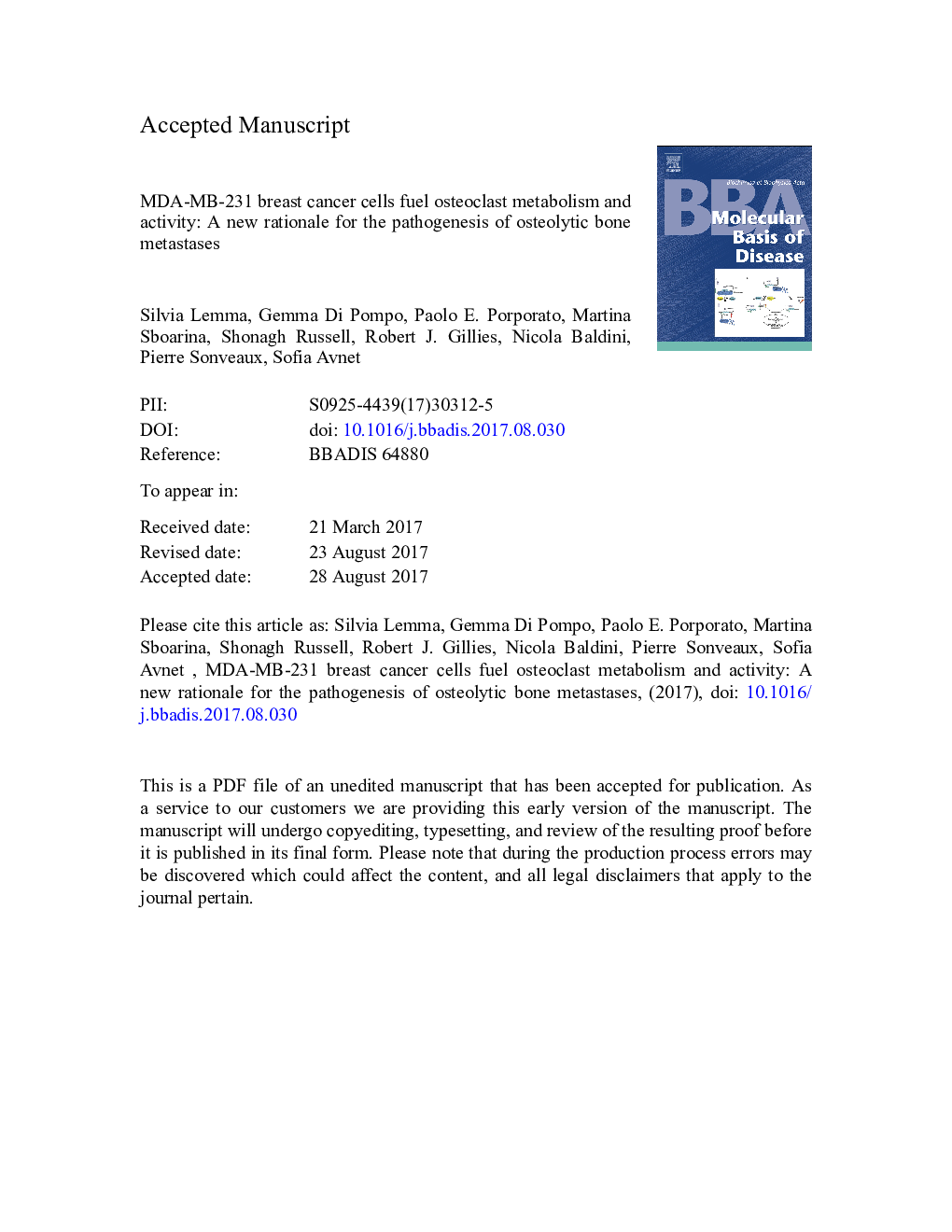| کد مقاله | کد نشریه | سال انتشار | مقاله انگلیسی | نسخه تمام متن |
|---|---|---|---|---|
| 8258829 | 1534614 | 2017 | 34 صفحه PDF | دانلود رایگان |
عنوان انگلیسی مقاله ISI
MDA-MB-231 breast cancer cells fuel osteoclast metabolism and activity: A new rationale for the pathogenesis of osteolytic bone metastases
دانلود مقاله + سفارش ترجمه
دانلود مقاله ISI انگلیسی
رایگان برای ایرانیان
کلمات کلیدی
GLUT1TGF-βTRAcPCTSKPTHrPIGF-2OCROPGMMP9ECARFCCPMCTMSCRANKLIL-6PBMCTBPTCAOsteoprotegerin - استئوپروتگرینOsteoclast - استخوانکاه، استئوکلاستtricarboxylic acid - اسید تری کربوکسیلیکtartrate-resistant acid phosphatase - اسید فسفاتاز مقاوم در برابر تارتاتinterleukin-6 - اینترلوکین ۶Transforming growth factor β - تبدیل فاکتور رشد βtumor necrosis factor-α - تومور نکروز عامل αRank - رتبهBreast cancer - سرطان پستانperipheral blood mononuclear cells - سلول های تک هسته ای خون محیطیMesenchymal stromal cells - سلولهای استرومایی مزانشیمی یا سلول های بنیادی مزانشیمیConditioned medium - شرایط محیطیInsulin-like growth factor-2 - فاکتور رشد مانند انسولین-2TNF-α - فاکتور نکروز توموری آلفاLactate - لاکتاتmacrophage colony-stimulating factor - ماکروفاژ عامل کلونی تحریک کنندهTumor metabolism - متابولیسم تومورBone metastases - متاستاز استخوانmonocarboxylate transporter - مونوکربوکسیلاک حمل کنندهOxygen consumption rate - میزان مصرف اکسیژنextracellular acidification rate - نرخ اسیدی شدن خارج سلولیTATA-binding protein - پروتئین متصل به TATAParathyroid hormone-related peptide - پپتید مرتبط با هورمون پاراتیروئیدCathepsin K - کتهفسین کglucose transporter 1 - گلوکز 1receptor activator of NF-κB - گیرنده گیرنده NF-κBreceptor activator of NF-κB ligand - گیرنده گیرنده لیگاند NF-κB
موضوعات مرتبط
علوم زیستی و بیوفناوری
بیوشیمی، ژنتیک و زیست شناسی مولکولی
سالمندی
پیش نمایش صفحه اول مقاله

چکیده انگلیسی
Recent progress in dissecting the molecular paracrine circuits of cancer and stromal cells in bone metastases (BM) are offering new options to improve current merely palliative approach. The study of tumor-stroma metabolic interplay may further ameliorate this scenario. In this context, we demonstrated that highly glycolytic MDA-MB-231 cancer cells, that form osteolytic BM in vivo, release a large amount of lactate at a significantly higher level than MCF7 cells. Thus, we speculated that lactate released from carcinoma cells is uptaken and metabolically used by osteoclasts, the key players of osteolysis associated with BM. First, we demonstrated that the release of lactate at the bone site is mediated by monocarboxylate transporter 4 (MCT4), as revealed by immunostaining and MCT4 localization at the plasma membrane of tumor cells in mouse model of BM and in human tissue sections of BM. Then, we showed that in vitro lactate is uptaken by osteoclasts to be used as a fuel for the oxidative metabolism of osteoclasts, ultimately enhancing Type I collagen resorption. The passive transport of lactate into osteoclasts was mediated by MCT1: MCT1 expression is significantly upregulated during osteoclast differentiation and Type I collagen resorption is significantly impaired when osteoclasts are treated with 7-(N-benzyl-N-methylamino)-2-oxo-2H-chromene-3-carboxylic acid, an MCT-1 inhibitor. Together, these data demonstrate that lactate released by glycolytic breast carcinoma cells in the bone microenvironment promotes the formation of osteolytic lesions, and provide the rationale for further studies on the use of MCT1 targeting as a novel therapeutic approach in advanced cancer patients with BM.
ناشر
Database: Elsevier - ScienceDirect (ساینس دایرکت)
Journal: Biochimica et Biophysica Acta (BBA) - Molecular Basis of Disease - Volume 1863, Issue 12, December 2017, Pages 3254-3264
Journal: Biochimica et Biophysica Acta (BBA) - Molecular Basis of Disease - Volume 1863, Issue 12, December 2017, Pages 3254-3264
نویسندگان
Silvia Lemma, Gemma Di Pompo, Paolo E. Porporato, Martina Sboarina, Shonagh Russell, Robert J. Gillies, Nicola Baldini, Pierre Sonveaux, Sofia Avnet,